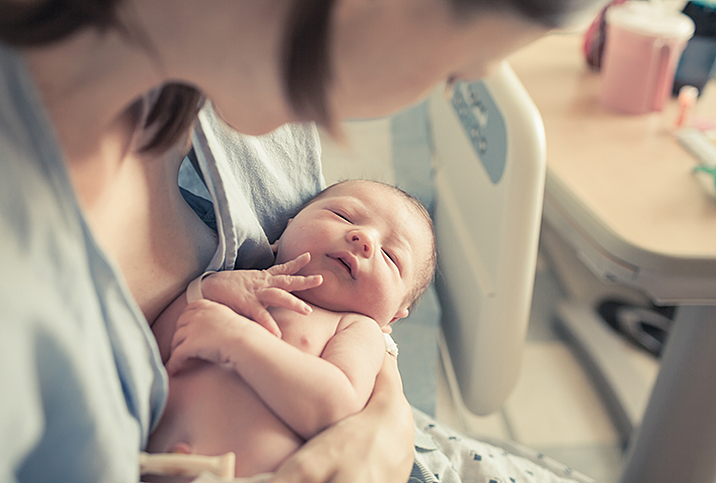More Than One-Third of Women Experience Postpartum Complications

Key Points
- Maternal health complications include a broad spectrum of conditions, some of which can be life-threatening.
- New research suggests these problems affect about 35 percent of women worldwide and can last for several years after delivery.
- Proper medical care and social support before, during and after pregnancy can help to prevent short-term problems from becoming chronic conditions.
The transition to postpartum life can be challenging, even for healthy mothers, but new research indicates more than one-third of women may face additional physical and emotional hurdles.
Approximately 35 percent of women worldwide experience postpartum complications, ranging from painful sex and urinary incontinence to secondary infertility and postpartum depression, according to a 2023 World Health Organization (WHO) report.
These postpartum health issues, which can profoundly affect maternal health and quality of life, sometimes last for years after delivery.
What health problems do some women experience after giving birth?
In the 2023 study published in The Lancet, researchers reviewed 32 conditions, with the following being most common:
- Pain during sexual intercourse, or dyspareunia (35 percent)
- Low back pain (32 percent)
- Anal incontinence (19 percent)
- Urinary incontinence (8-31 percent)
- Anxiety (9-24 percent)
- Depression (11-17 percent)
- Perineal pain (11 percent)
- Secondary infertility (11 percent)
- Fear of childbirth, or tokophobia (6-15 percent)
"Many postpartum conditions cause considerable suffering in women's daily life long after birth, both emotionally and physically, and yet they are largely underappreciated, underrecognized, and underreported," said Pascale Allotey, Ph.D., director of sexual and reproductive health and research at WHO, who was not involved in the study, in a press release.
"Throughout their lives, and beyond motherhood, women need access to a range of services from healthcare providers who listen to their concerns and meet their needs," Allotey said. "So, they not only survive childbirth but can enjoy good health and quality of life."
Why do some women experience health issues postpartum?
"Pregnancy and childbirth are significant physical, hormonal, mental and emotional stressors to the body and mind," said Kelly Culwell, M.D., a San Diego-based OB-GYN.
"The physiologic changes that occur throughout the process can potentially lead to long-term issues when combined with other factors, such as poor maternal health, the baby's size or position, a lack of support and complications that arise during labor and delivery," said Tiffany Pham, D.O., an OB-GYN in Houston and a medical advisor at women's health app Flo.
She also noted that injuries to the pelvic floor during birth may cause one or more pelvic organs (including the bladder, rectum or uterus) to prolapse, or fall, leading to anal or urinary incontinence.
"Long labors, large babies, advanced maternal age and medical interventions during birth, such as forceps deliveries or episiotomies, can contribute to pelvic floor issues," said Brittani Bromley, A.P.R.N., associate dean of nursing at Rasmussen University–Eagan in Minnesota.
"Additionally, having a large baby may contribute to abdominal injuries, such as diastasis recti—the separation of the abdominal muscles," Bromley said.
Women with pre-existing chronic conditions, such as diabetes or hypertension, have a higher risk of physical postpartum health issues compared to those who don't, she said. Those who develop complications during pregnancy, such as gestational diabetes, are also more vulnerable, as are those who are ages 35 or older.
Recommended
- Maternal Mental Health: The Unspoken Crisis Damaging Postpartum Care: Don't let the pressure to be the perfect mom stop you from asking for help.
- New Moms Need to Think About Their Health, Too: Your body and mind go through a lot during 'the fourth trimester.' Pay attention to them.
- Postpartum Depression and Sex Drive: Postpartum depression can create rifts between partners and sever intimate bonds.
Similarly, research indicates women with a history of chronic stress or psychiatric conditions, such as depression or anxiety, are more likely to experience new or worse mental health symptoms in the postpartum period and beyond.
However, postpartum mood disorders (PPMDs), like many chronic conditions, can affect anyone.
"Housing or food insecurity, sleep deprivation, breastfeeding difficulties, pressures of parenting perfection, difficulty obtaining childcare and poor clinical and parental support in the postpartum period can all worsen mental health and contribute to PPMDs," Pham said.
How common is it to have long-term health complications after labor and delivery?
Every year, roughly 40 million women experience a long-term problem related to pregnancy or childbirth, per the WHO report. Many issues affecting new moms' health are more prevalent in places with less developed maternal health systems.
However, postpartum complications such as pain with intercourse, urinary incontinence and mental health conditions are common in the United States.
"A recent study by BlueCross BlueShield (BCBS) reported approximately 80 percent of patients had healthy pregnancies and deliveries, but rates of complications have increased," Bromley said. "From 2014 to 2018, the rate rose by more than 16 percent. This can be tied directly to postpartum complications and emotional health."
The BCBS study only evaluated commercially insured women, but other research suggests maternal morbidity and mortality rates are also rising in the broader population. In 2021, 1,205 women died from pregnancy or birth-related complications, compared to 861 in 2020 and 754 in 2019, indicated a report from the Centers for Disease Control and Prevention (CDC).
More than 80 percent of maternal deaths were preventable, according to data from 2017 to 2019, as suggested by a 2022 CDC report. Mental health conditions, including suicide and substance use disorder, accounted for the most deaths (23 percent), followed by excessive bleeding (14 percent) and heart conditions (13 percent).
Approximately 25 percent of American women experience pelvic floor dysfunction, according to a 2018 study published in The Journal of the American Medical Association (JAMA).
Additionally, about one in seven birthing people develop postpartum depression, according to a 2022 report published in the National Library of Medicine. Of women who experienced pregnancy-related heart attacks, 51 percent had them in the postpartum period, per a 2020 report published in the Journal of the American Heart Association.
What can you do to prevent postpartum complications?
Is there anything women can do before giving birth to help prevent health complications after labor and delivery?
"Ensuring you are in the best possible physical and mental health before becoming pregnant is important—particularly if you have a chronic medical condition," Culwell said.
Managing conditions such as diabetes, heart disease, depression or obesity before pregnancy can significantly improve the chances of a healthy pregnancy and postpartum period and, potentially, save your life.
Talk to your healthcare provider for individualized advice on how to do so.
"Maintaining good health throughout pregnancy is equally vital," Pham said.
Some ways to help maintain your health during your pregnancy include the following suggestions:
- Connect with social support services or other community resources that can help you with financial, food or housing insecurity challenges.
- Discuss childcare options with your family and find daycare services.
- Employ techniques such as perineal massage during labor to diminish the risk of injuries and pain.
- Ensure you have adequate social support during pregnancy.
- Find peer support groups to discuss concerns about pregnancy, childbirth and the postpartum period.
- Keep up with prenatal appointments and testing to detect potential problems before birth.
- Meet with a lactation specialist if you intend to breastfeed.
- Notify your healthcare provider of any complications you had with previous pregnancies.
- Stay active and maintain a healthy diet.
- Talk to a mental health provider, especially if you're at risk for PPMDs or are afraid of childbirth.
- Work with a pelvic floor physical therapist to strengthen your pelvic floor muscles.
Should You Be Sweating to Help Your Fertility or Menstrual Cycle?: Some people believe infrared saunas can help conditions from painful periods to fertility.
What should postpartum women who experience pain during sex do?
"It's generally not recommended to have vaginal intercourse within the first six weeks after delivery," Culwell said. "Once you're ready, take things slow. You may need to use extra lubricant or try different positions to find what's comfortable."
If you're still experiencing painful sex postpartum, make a note of your symptoms and talk to your healthcare provider so they can determine the potential cause(s), Pham said.
"For example, vaginal dryness, one of the most prevalent issues, can stem from hormonal changes related to birth and breastfeeding," Culwell said.
Depending on the problem, your doctor may recommend treatments such as an estrogen supplement for dryness, physical therapy for pelvic floor disorders, or counseling for body image issues, relationship challenges, or other mental health concerns.
"Psycho-social challenges–such as body image issues that decrease your desire or a traumatic birth experience that instills fear of penetration or tension in your relationship—could also contribute," Pham said.
Where should you go for help if you have long-term health effects after giving birth?
"Talk to your doctor or midwife first if you're experiencing postpartum complications," Bromley said. "If they can't personally address the issue, they can refer you to another healthcare provider who can."
For instance, you may need to work with a pelvic floor physical therapist to treat pelvic floor disorders or a mental health counselor for PPMDs.
"A sex therapist may also be helpful if you're experiencing painful sex without a purely physical cause," Pham said.
For persistent back pain, anal incontinence or severe pelvic organ prolapse, your healthcare provider may recommend seeing an orthopedic or colorectal surgeon or a urogynecologist, respectively, she added.
Also, be on the lookout for warning signs that could indicate a life-threatening emergency, such as blood clots, a heart attack or stroke, or postpartum dysphoric disorder (PMDD), per the CDC.
If you experience any of the following symptoms, seek immediate healthcare:
- A fever of 100.4 Fahrenheit or higher
- Chest pain
- Dizziness or fainting
- Extreme swelling of the hands or face
- Fast heartbeat
- Overwhelming tiredness
- Persistent and severe headache
- Severe and persistent belly pain
- Severe nausea and vomiting
- Severe swelling, redness or pain in your leg or arm
- Thoughts of harming yourself or your baby
- Trouble breathing
- Unusual vaginal bleeding or discharge
- Vision changes
Maternal health complications are often overlooked
Maternal health conditions are frequently "neglected" or "ignored" by healthcare providers, researchers and policymakers, according to the authors of the WHO study.
"Many of the medium-term and long-term (and often chronic) complications, which emerge after six weeks following childbirth, are comparatively less visible, or completely ignored," they wrote.
The researchers call for a more holistic approach to maternal healthcare that focuses on immediate biomedical factors as well as social, environmental and economic conditions that can affect women's health and well-being.
Women must advocate for themselves to get the care they need. Providers downplaying or dismissing concerns can have dangerous implications for women's mental and physical health, according to the WHO study.
In these situations, Bromley recommended women first ask clarifying questions and emphasize how their symptoms affect their quality of life.
"Being open about how your life is being affected can help providers understand the magnitude of the problem," she said. "I also encourage women to go to support groups during the postpartum time to help gain support from other women."
If a healthcare provider is still not taking your concerns seriously, Culwell suggests seeking a second opinion.
The bottom line
A physically and emotionally healthy pregnancy can better lead to a healthy postpartum period. Although complications are relatively common, they are also highly treatable.
Speak with your doctor or another healthcare provider if you have any concerns about your health and well-being during this period.


















